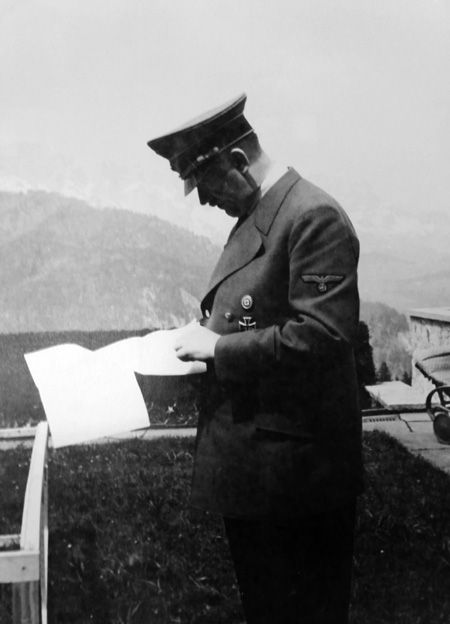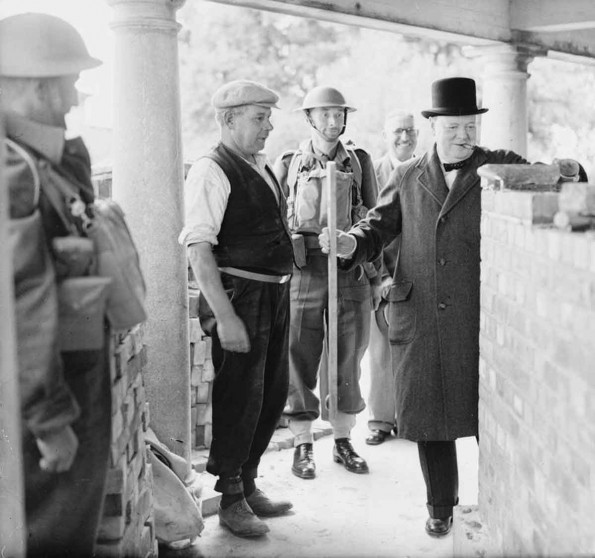Wednesday 17 July 1940
 |
| Hitler at the Berghof, July 12-17 1940 (photo by Eva Braun). |
Battle of the Atlantic: U-34 (Kapitänleutnant Wilhelm Rollmann) surfaces and uses its deck gun against the 3531 ton Greek freighter Naftilos in the southwest approaches at 01:10. The 28-man crew gets away though one man later perishes.
U-43 (Kapitänleutnant Wilhelm Ambrosius) torpedoes and sinks British 3509 ton freighter Fellside 135 nautical miles northwest of Bloody Foreland, Ireland. There are 21 survivors and 12 perish. The Fellside is a straggler from Convoy OA 184.
U-57 (Oberleutnant zur See Erich Topp) torpedoes and sinks 8652-ton British tanker Manipur about 10 miles northwest of Cape Wrath, Scotland. There are 65 survivors, while 14 perish.
U-57 also sinks 1960 ton Swedish freighter, O.A. Brodin, off the Orkneys. There are 21 survivors and 3 perish.
British submarine HMS H31, an old Great War sub, torpedoes and sinks Kriegsmarine anti-submarine trawler Steiermark near Holland.
The 758-ton tug RFA Steady hits a mine and sinks at Newhaven. All thirteen aboard survive.
The Luftwaffe bombs and sinks 435-ton freighter Leola about 50 miles east of the Scillies. There are two dead.
The Luftwaffe attacks and damages Dutch freighter De Zeester 15 miles southwest of Bishop Light.
Convoy OA 186 departs from Methil, OG 38 departs from Liverpool.
Destroyer USS Plunkett (DD 431, Lt. Commander Peter G. Hale) is commissioned.
 |
| Prime Minister Winston Churchill helps to build a pillbox at Canford Cliffs, Poole, England, during a visit to Southern Command on 17 July 1940. |
In North Africa, the RAF bombs Tobruk harbor, El Gubbi, Libya, and Assab and Agordat, Eritrea.
At Malta, the Admiralty considers using a fast ship of the Glen Line to supply the island. The RAF also assigns 3 Wellington bombers to the island, though Governor Dobbie does not find this to be a particularly good idea. He tells Whitehall that unless better defenses can be sent to the island, a bomber force would just be a liability.
Anglo/Japanese Relations: The British accede to Japanese pressure and agree to close the Burma Road route into China over the Himalayas. Supposedly, this is just for three months while the British government "focuses on other things." The Japanese believe, with some justification, that the road is being used to supply Chiang Kai-shek with military supplies. Massed Japanese troops on the Hong Kong border, threatening to invade the British colony, amplify their concerns.
British MPs are unimpressed by the decision, which they feel is cowardly, and yell at the government. The Japanese try to make it look as if they also gave up something by "promising" to seek peace with China. Now that the Japanese have closed the supply routes to Chiang both through French Indochina and over the Burma Road, the Chinese Nationalists are isolated.
Soviet/Baltic State Relations: Antanas Merkys, who has been acting as President of Lithuania, is deported to Saratov in Siberia.
There are "spontaneous" worker demonstrations throughout the area "demanding" that the formerly independent nations become Soviet republics.
Applied Science: German physicist Baron Carl Friedrich von Weizsacker proposes to the German Army Weapons Bureau that reactors can be used to create neptunium for the construction of atomic bombs.
British Military: Admiral Roger Keyes forms the Combined Operations Headquarters.
 |
| Hawker Hurricanes during the Battle of Britain. |
British Indian Military: The Central India Horse is ordered to Egypt. About 100 men refuse, are arrested, and are subsequently court-martialed. Sixteen are ultimately executed
Vichy Government: Employment is barred to anyone not born of French parents - which effectively forces refugees to either return to their homes or go somewhere else.
Japanese Government: Prince Konoye appoints his new war cabinet. The most important post, Foreign Minister, is Matsuoka. General Tojo becomes Minister of War.
Norway: German forces, unhindered, complete the total occupation of Norway.
Holocaust: The concentration camps are gradually picking up steam. They are populated by German dissidents as well as Jews and other religions. Werner Scholem, a German communist, perishes at Buchenwald.
Future History: Merton Laverne Lundquist, Jr. is born in Duluth, Minnesota. Lundquist becomes a broadcaster for WFAA in Dallas and ultimately progresses to become the voice of the Dallas Cowboys in 1967. In addition to his Cowboys work, Lundquist begins working with ABC Sports beginning in 1974, and later with CBS in 1982 and TNT cable beginning in 1995. Verne Lundquist becomes a legendary football broadcaster, also calling some Winter Olympics Games and many other major sporting events such as the historic 50th Masters Tournament won by Jack Nicklaus. He retires with the Army-Navy game of 10 December 2016.
 |
| A sign posted in a Paris railway station states that nobody is allowed entry without a permit. This is a fairly typical sign in occupied areas. July 17, 1940. |
July 1, 1940: Vichy France
July 2, 1940: Arandora Star
July 3, 1940: Operation Catapult at Mers El Kébir
July 4, 1940: Romania In Crisis
July 5, 1940: The Five Freedoms
July 6, 1940: Hitler's High Point
July 7 1940: Dakar And Ringo
July 8, 1940: Tea Rationing in England
July 9, 1940: Battle of Calabria
July 10, 1940: Battle of Britain Begins
July 11, 1940: "Nous, Philippe Petain"
July 12, 1940: Enter Laval
July 13, 1940: German Surface Raiders Attack!
July 14, 1940: Bastille/Mourning Day
July 15, 1940: Tallest Man Dies
July 16, 1940: Plans for Sea Lion
July 17, 1940: Burma Road Closed
July 18, 1940: FDR Runs Again
July 19, 1940: Last Appeal To Reason
July 20, 1940: First Night Fighter Victory
July 21, 1940: Soviets Absorb Baltic States
July 22, 1940: First RAF Night Fighter Victory
July 23, 1940: Invasion False Alarm
July 24, 1940: The Meknés Incident
July 25, 1940: Black Thursday for RAF
July 26, 1940: Capture The Duke?
July 27, 1940: What's Up, Doc?
July 28, 1940: Destroyers Pulled From Dover
July 29, 1940: Barbarossa On The Burner
July 30, 1940: Hitler Delays Sealion
July 31, 1940: Bloody Wednesday of Olkusz
2020



